NFL To Weigh Major Changes, Including How Games Begin And How Defenders Tackle
The NFL will consider numerous significant rules changes next week when owners gather for their spring meeting in Orlando. And those changes would alter the way fans see, bet and feel about the game, as well as how players do things so fundamental as tackling.
The league on Wednesday released its list of proposed changes from clubs and the competition committee. And some of the proposals are big.
Big as in how a game actually begins.
Big as in affecting a play that potentially would've changed the outcome of a Super Bowl.
Big as in how defensive players are allowed to tackle.
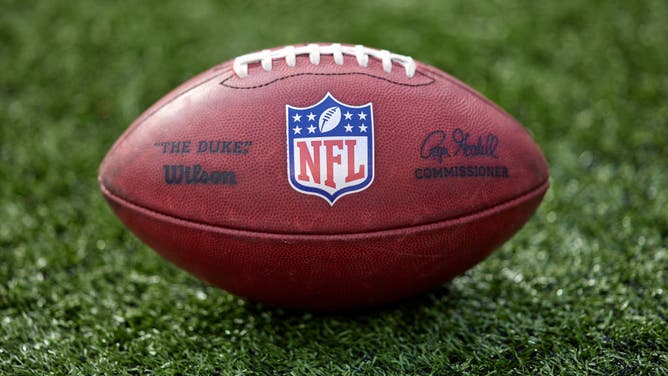
Kickoff Rule That Changes Everything
The competition committee, at the behest of practically all the league's special teams coordinators and coaches, wants to create a new kickoff that is designed to: (1) resemble a typical scrimmage play by aligning players on both teams closer together and restricting movement to reduce space and speed; and (2) promote more returns.
You want some specifics on the so-called NFL hybrid kickoff?
The NFL's playing rule proposal 10 covers all things kickoff and is expected to be voted on next week by owners. The rule change would apply for only one year as a test period. But it's a lot because it includes eight pages of new rules applying to an allowed kickoff formation, ball placement prior and after the kick, and a huge change to the rules governing onside kicks.
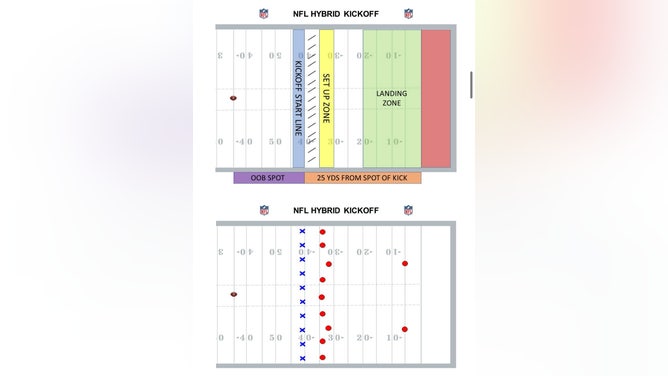
NFL Wants Hybrid Kickoff In 2024
It basically keeps the kicker swinging for the fences from his 35 yard line as before, but lines up the opposing teams 5 yards apart between the receiving team's 40- and 35-yard lines. The point of this is to make the play more closely resemble a play from scrimmage where players cannot get a major running start at an opponent – thus decreasing the potential for injuries.
The play sets up a landing zone from the 20 yard line to the goal line where the receiving team can position two potential returners.
A kick into the end zone that remains inbounds must be returned or downed by the receiving team, otherwise it is a live ball. It is a touchback and the dead ball spot is the 20-yard line if a kick touches the ground or a player in the landing zone, rolls beyond the goal line and is downed in the end zone.
The dead ball spot is the 35-yard line if a free kick goes out of bounds behind the receiving team’s goal line, strikes the receiving team’s goal post, uprights, or cross bar, or lands at or beyond the goal line and is downed in the end zone by the receiving team.
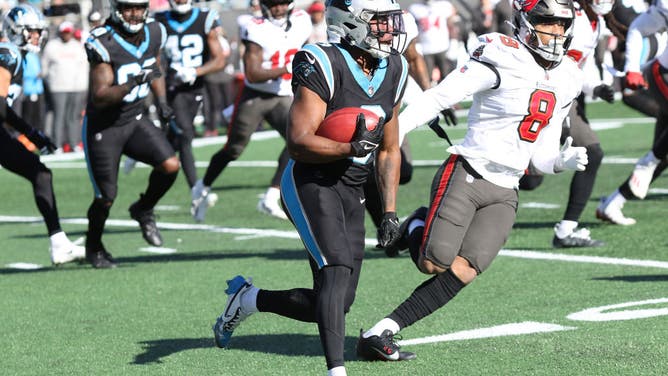
CHARLOTTE, NC - JANUARY 07: Carolina Panthers running back Raheem Blackshear (3) looks for running room on a kick off return during an NFL football game between the Tampa Bay Buccaneers and the Carolina Panthers on January 7, 2024 at Bank of America Stadium in Charlotte, N.C. (Photo by John Byrum/Icon Sportswire via Getty Images)
Onside Kick Turned On Its Ear
The craziest part of this proposal is perhaps new rules regarding onside kicks. And by new, it might mean new and philosophically questionable.
First of all, onside kicks would be limited to the fourth quarter. And a team intending to use the onside kick would have to tell game officials of their intention and the officials will then inform the receiving team.
So much for the surprise of the onside kick.
If you recall, the Saints used an onside kick to catch the Colts unaware to start the second half of Super Bowl XLIV. The Saints recovered that surprise kick and went on to win their only Super Bowl title.
The new onside kick rules would have prevented New Orleans coach Sean Payton from trying the surprise move because it didn't happen in the fourth quarter and, even if it had, Payton would have had to inform the Colts it was coming.
NFL special teams coaches say the onside kick is a dinosaur. Only two surprise onside kicks were attempted last season so it's not a part ofthe game anymore.
Fine. But this part of the kickoff hybrid still feels, wrong. Because it eliminates the element of surprise from the game. And limits a play-call to one quarter when a team is trailing.
No other rule prevents coaches from using a play in their playbook from using it until one specific quarter and then having to inform the opposition it is coming. This is how the onside kick is reimagined:
"At any time during the fourth period, the kicking team, if trailing its opponent, may declare an onside kick by notifying the referee prior to the start of the play clock (25-second play clock after the back Judge hands the kicker the ball). The referee will then notify the receiving team before starting the play clock and the following rules will apply.
Yuck.
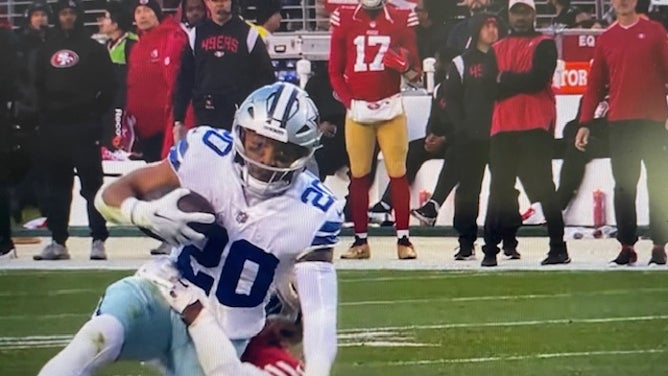
NFL Targets ‘hip drop tackle’ for elimination
This is not where the league and its competition want to stop making changes.
The NFL has foreshadowed its desire to eliminate the so-called hip-drop tackle. That tackle happens when a defender grabs a ballcarrier from behind and drops all his weight to force the ballcarrier down. As often happens, the defender lands on the ballcarrier's legs – sometimes causing knee or ankle injuries.
It's a popular tackle technique and the NFL wants it out of the game.
Here's the competition committee's proposed language:
"It is a foul if a player uses the following technique to bring a runner to the ground: (a) grabs the runner with both hands or wraps the runner with both arms; and drops his weight by swiveling and dropping his hips and/or lower body, landing on and trapping the runner’s leg(s) at or below the knee.
The penalty for the hip-drop tackle would be 15 yards and an automatic first down for the offense.
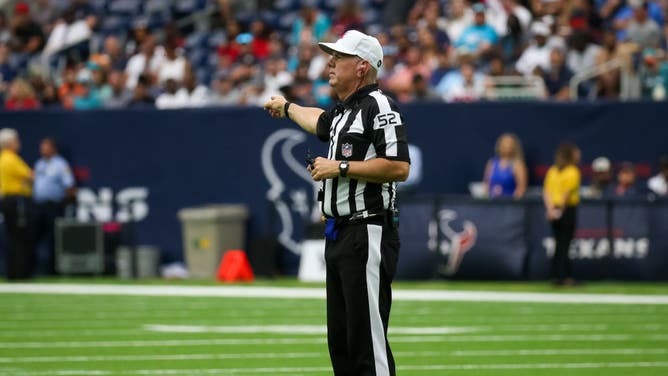
NFL official, who already deal with full plate of rules, may get some more coming. (Photo by Leslie Plaza Johnson/Icon Sportswire via Getty Images)
NFL: Hip Drop Causes Injuries
So why is the NFL trying to eliminate this popular tackling technique? Injuries.
"It remains from our analysis a technique that results in about a 25-times rate of injury as opposed to a typical tackle," NFL executive vice president Jeff Miller said during the past season. "It is an unforgiving behavior that we need to try to define and get out of the game."
Other proposals owners will consider:
The Steelers want to move the trading deadline to the Tuesday after Week 9 games. The Browns, Lions, Jets, Eagles, Commanders, and 49ers want to move the trading deadline to the Tuesday after Week 10 games.
The Steelers' proposal specifically addresses moving the deadline to the midpoint of an 18-game season. An 18-game season, y'all.
The proposal by the other teams accounts for 2021 change to a 17-game season.
The Bills want to expand to permit clubs to elevate a third player from its practice squad who is a quarterback to be an emergency third quarterback on game day. Because no one wants to see the punter playing quarterback if the starter and backup QB get injured.
Finally, the NFL wants to weigh expanding the use of instant replay. There's a proposal to allow a replay review when there is clear and obvious visual evidence that the game clock expired before any snap. There's a proposal to include a ruling of a passer down by contact or out of bounds before throwing a pass as a reviewable play. And the Colts are proposing that either a coach or replay official (inside of two minutes) can challenge any foul that has been called, whereas now the coach cannot do so.